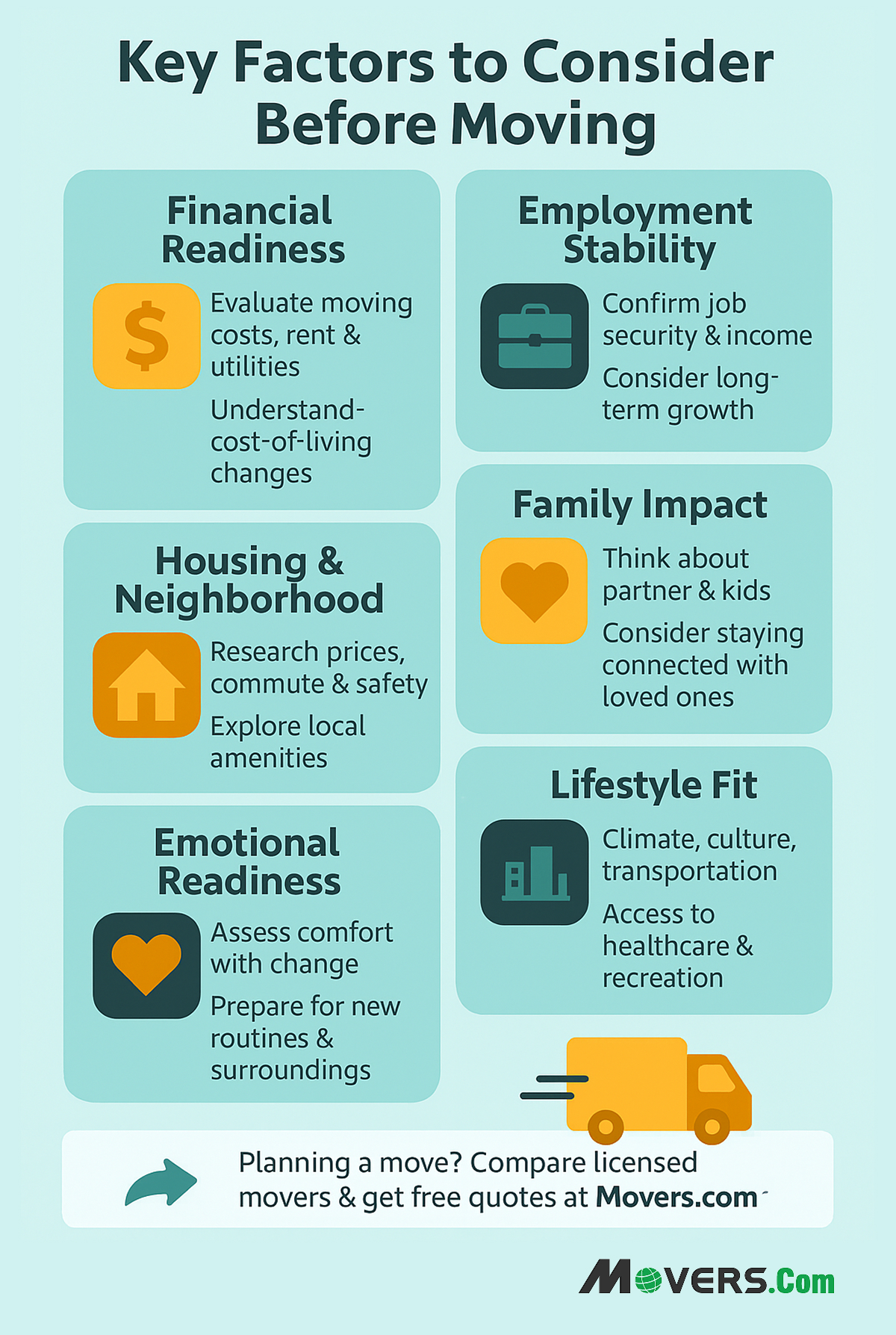There are many reasons to relocate -- attending the college of your dreams, following a loved one or just getting an invigorating fresh start with a change of scenery. However, moves are commonly motivated by financial reasons. Before choosing a new city or town to call home, the six factors you should consider are the area's housing market, job market, heating and cooling costs, taxes, cost of living and crime rate.
Researching these factors will give you a much better idea of how living in a new area will feel. It may be impossible to find an area that is perfect in every category, so you should do your best prioritizing which factors mean the most to you.
What is the housing market like?
The cost of housing varies greatly from region to region and can be a significant motivator when choosing a new locale to call home.
- A small residence in a higher-cost area will be more expensive than an upscale home in a lower-cost district
- A tiny, expensive apartment may not accommodate changes in lifestyle, like starting a family or aging
- If you cannot afford to rent a larger apartment or buy a home in a costly city, consider relocating to a suburb
Affordable housing will be more abundant in rural areas. Real estate moving along the coast is usually more expensive than property located inland. When doing your research on an area, look at the median and average rent or house cost. The median will be the amount most people pay while the average will be average of what everyone pays.
Average rent cost varies greatly even within the same state. New York City has an average rent of $3,634 while Rochester, New York has an average rent of $1,105. Having a more specific area of location that you are moving to will allow for a more accurate estimate of housing cost.
Is the job market very competitive?
Relocating in search of a lucrative career is also common, especially among young college graduates. In the wake of the economic downturn, the job market has become increasingly competitive, forcing job seekers to remain flexible and seek employment opportunities across state lines.
Your favorite search engine will allow you to research the job market in the areas of interest. The best metric to aid you on your search is the unemployment rate of an area. The national average rate of unemployment is currently 3.9 percent as of April 2018. If you are able to find a city/area with less than 3.9 percent rate of unemployment, it is safe to say that the job market is favorable there.
How will the climate affect energy costs?
You may think that leaving a high-cost city such as San Diego in favor of the more affordable Dallas is a no-brainer, but the price of homes or rent is not the only factor to consider. The moderate climate of San Diego will keep your energy costs low. Your air-conditioning bills will hit the roof when attempting to keep your home comfortable in humid Texas weather. If the climate is extreme, your cooling (or heating) costs will increase dramatically.
Additionally, while extremely hot and humid weather can hike up your energy bills, warming homes in colder climates will cost you even more. For what you are paying for a tiny apartment in a Northern California city, you could potentially afford a much larger home in Rochester, New York. However, keeping the vast space warm during the region's long, cold winter months will make the price difference less drastic.
What kind of taxes will you pay?
Property taxes, income taxes and sales taxes vary greatly from region to region. Some states may levy a lower state income tax, while others -- such as Alaska, Florida, Washington and Texas, will take none at all. Some cities -- such as Los Angeles, San Francisco and Seattle -- have much higher sales tax rates, while cities in states like Oregon, New Hampshire, Delaware and Montana have zero sales tax.
Does the area have a high cost of living?
The cost of goods and services varies from city to city and tends to be highest in the most densely-populated cities. The essential expenses to consider when relocating are:
-
Groceries
-
Healthcare
-
Gas
-
Utilities
-
Entertainment
Cost of living is the amount of money spent to maintain the average standard of day-to-day life.
A gallon of milk will cost you $2.39 in New York City, while in Hawaii, it will cost you $3.76. Be sure to do your research on your prospective relocation area to find out how much you will be spending. Our online calculator will help you compare the cost of living between cities as well as their quality of life, poverty rates and climates.
Does the area have a high crime rate?
Sometimes, an area may seem perfect, low taxes, moderate climate, affordable housing. However, it's important to check the prevalence of violent crimes in the area before making your final decision. Exposure to a high crime rate leaves your home and your family susceptible to theft, assault and personal harm.
Crime and property value are entwined, so find out if that's why houses are cheap. You shouldn't sacrifice safety to save money.
Investigate the situation on your own. If you can, visit the area during the day and talk to locals. Ask them their honest opinions. Are you comfortable with their answers? You can also research statistics online or use our crime report calculator to compare two cities.
